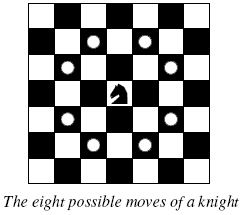poj 2488 A Knight's Journey(暴力dfs 你懂的)
http://poj.org/problem?id=2488
A Knight's Journey
| Time Limit: 1000MS | Memory Limit: 65536K | |
| Total Submissions: 24572 | Accepted: 8305 |
Description
 Background The knight is getting bored of seeing the same black and white squares again and again and has decided to make a journey around the world. Whenever a knight moves, it is two squares in one direction and one square perpendicular to this. The world of a knight is the chessboard he is living on. Our knight lives on a chessboard that has a smaller area than a regular 8 * 8 board, but it is still rectangular. Can you help this adventurous knight to make travel plans?
Background The knight is getting bored of seeing the same black and white squares again and again and has decided to make a journey around the world. Whenever a knight moves, it is two squares in one direction and one square perpendicular to this. The world of a knight is the chessboard he is living on. Our knight lives on a chessboard that has a smaller area than a regular 8 * 8 board, but it is still rectangular. Can you help this adventurous knight to make travel plans? Problem Find a path such that the knight visits every square once. The knight can start and end on any square of the board.
Input
The input begins with a positive integer n in the first line. The following lines contain n test cases. Each test case consists of a single line with two positive integers p and q, such that 1 <= p * q <= 26. This represents a p * q chessboard, where p describes how many different square numbers 1, . . . , p exist, q describes how many different square letters exist. These are the first q letters of the Latin alphabet: A, . . .
Output
The output for every scenario begins with a line containing "Scenario #i:", where i is the number of the scenario starting at 1. Then print a single line containing the lexicographically first path that visits all squares of the chessboard with knight moves followed by an empty line. The path should be given on a single line by concatenating the names of the visited squares. Each square name consists of a capital letter followed by a number. If no such path exist, you should output impossible on a single line.
Sample Input
3 1 1 2 3 4 3
Sample Output
Scenario #1: A1 Scenario #2: impossible Scenario #3: A1B3C1A2B4C2A3B1C3A4B2C4
分析:
这里 1 <= p * q <= 26 题目数据量不是很大,可以直接暴力dfs求解,主要是保证输出第一个为最小字典序,这里我们控制遍历搜索时的顺序就可以了,这里主要体现在以下数组中:
int cy[]={-2,-2,-1,-1,1,1,2,2};
int cx[]={-1,1,-2,2,-2,2,-1,1};
这里cy数组的值为 {-2,-2,-1,-1,1,1,2,2} 因为cy为 输出串中的 A,B,C 故优先选择,然后cx {-1,1,-2,2,-2,2,-1,1} 一小一大的排列
这样就可以保证最小字典序
代码:
1 #include <iostream> 2 #include <stdio.h> 3 #include <string.h> 4 5 using namespace std; 6 7 //这样设置这两个数组很好的保证了最后输出的序列是字典序 8 int cy[]={-2,-2,-1,-1,1,1,2,2}; 9 int cx[]={-1,1,-2,2,-2,2,-1,1}; 10 11 int mark[30][30]; 12 int flag=0; 13 14 void dfs(int n,int m,int x,int y,int cnt) 15 { 16 int i,j,k; 17 if(flag) //序列找到便不用在找 18 { 19 return; 20 } 21 if(cnt==n*m) //找到序列进行输出 22 { 23 for(k=1;k<=n*m;k++) 24 for(i=1;i<=n;i++) 25 { 26 for(j=1;j<=m;j++) 27 { 28 if(k==mark[i][j]) 29 { 30 printf("%c%d",'A'-1+j,i); 31 } 32 } 33 } 34 printf("\n"); 35 flag=1; //标记表示序列 36 return; 37 } 38 for(i=0;i<8;i++) 39 { 40 int dx=x+cx[i]; 41 int dy=y+cy[i]; 42 if(dx>=1&&dx<=n&&dy>=1&&dy<=m&&!mark[dx][dy]) 43 { 44 mark[dx][dy]=cnt+1; //标记这点的位置状态 45 dfs(n,m,dx,dy,cnt+1); //进行下一个点的查找 46 mark[dx][dy]=0; //回溯 47 } 48 } 49 } 50 51 int main() 52 { 53 int t,k; 54 scanf("%d",&t); 55 for(k=1;k<=t;k++) 56 { 57 int n,m; 58 scanf("%d%d",&n,&m); 59 printf("Scenario #%d:\n",k); 60 if(n==1&&m==1) 61 { 62 printf("A1\n\n"); 63 continue; 64 }else if(n==1||m==1) 65 { 66 printf("impossible\n\n"); 67 continue; 68 } 69 memset(mark,0,sizeof(mark)); 70 int i,j; 71 for(i=1;i<=n;i++) 72 { 73 for(j=1;j<=m;j++) 74 { 75 mark[i][j]=1; 76 flag=0; 77 dfs(n,m,i,j,1); 78 if(flag) 79 { 80 break; 81 } 82 memset(mark,0,sizeof(mark)); 83 } 84 if(j<=m) 85 { 86 break; 87 } 88 } 89 if(i>n) 90 { 91 printf("impossible\n"); 92 } 93 printf("\n"); 94 } 95 return 0; 96 }





 浙公网安备 33010602011771号
浙公网安备 33010602011771号